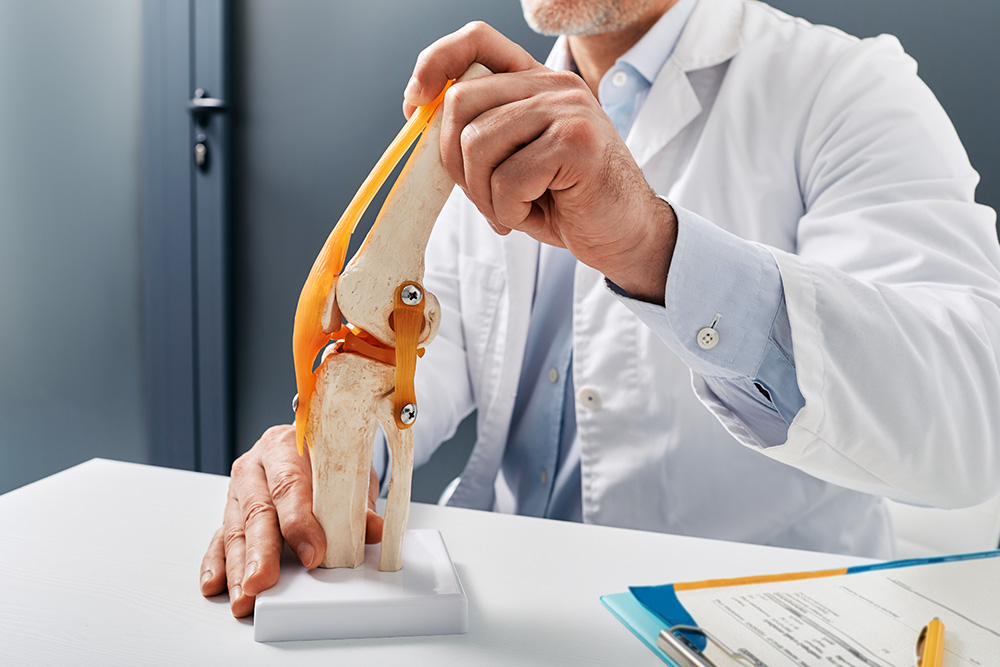
Expert Insights from Dr. Richard Cunningham, Orthopaedic Surgeon at Vail-Summit Orthopaedics & Neurosurgery
How Long Does It Take to Return to Sports After a Patellar Dislocation?
Patellar (knee cap) dislocations are serious injuries that typically occur during sports, a fall, or when the knee sustains a sudden rotational force. For active individuals, one of the first questions is: How long will it take to get back to the activities I love?
Below, Dr. Richard Cunningham, board-certified orthopedic surgeon and knee specialist at Vail-Summit Orthopaedics & Neurosurgery (VSON), explains recovery timelines, treatment options, and when surgery may be necessary if you dislocate your patella.
What Happens When the Patella Pops Out of Place?
The most common way to dislocate the patella is have the knee suddenly forced into a valgus or knock kneed position. Imagine a high school football player who is tackled from the side and their knee suddenly goes inward. This sudden motion can cause the knee cap to pop outward and dislocate out of the groove (trochlea). When the patella dislocates laterally, there is associated tearing of the medial patellofemoral ligament (MPFL) which is the main ligament that holds the patella in the groove. There is also commonly an associated tear of the MCL, or the ligament on the inside of the knee, which can tear with a sudden valgus force to the knee. In some cases, a dislocated patella will shift back into position as quickly as it came out.
If you feel that your patella is dislocated, it will usually pop back into place by simply straightening your knee out all of the way. Unfortunately, in other cases, the patella stays dislocated and patients must go to the emergency room to have their patella reduced back into the groove.
Symptoms often include feeling a pop and having immediate pain, swelling, instability, and tenderness. One should get your knee evaluated by an orthopedic knee specialist if you feel that you have sustained a patellar dislocation in order to be sure the patella is back in the groove, to assess the status of the MPFL and MCL, and to evaluate the bone and cartilage for injury.
What Is Patellar Dislocation Recovery Time?
Mild or first-time patellar dislocations may heal in 6 to 8 weeks with rest, bracing, and physical therapy. High energy patella dislocations may require surgical intervention and can take several months to fully heal.
Physical therapy focuses on restoring strength, motion, and alignment. Dr. Cunningham reminds patients: “Rushing recovery increases the risk of re-injury. We want the knee strong and stable before returning to sport.”
Understanding patellar dislocation recovery time helps athletes set expectations and commit to full rehabilitation for lasting results.
How Many Knee Dislocations Before Surgery is Indicated?
Many patients wonder how many patellar dislocations before surgery is warranted? While a single dislocation can often be treated non-surgically, multiple dislocations (3 or greater) usually indicate chronic instability that typically requires surgical reconstruction.
“If the kneecap slips out repeatedly, it can wear away cartilage,” says Dr. Cunningham. “Surgical stabilization restores alignment, prevents further damage and provides confidence in the stability of the knee.”
Other factors such as age, activity level, and imaging results all play a role in tailoring the best treatment plan.
Surgery consists of reconstructing the torn MPFL, addressing any cartilage damage, and possibly performing a tibial tubercle osteotomy if the patella is not aligned centrally in the groove.
When Can You Return to Sports?
Returning to sports depends on healing, strength, and confidence. First time dislocations where no surgery is required may return within 6- 8 weeks. More complex cases or surgical cases may take 6 months. Clearance is based on strength testing and functional movement rather than time alone.
When to See a Knee Specialist
If your patella popped out of place then right back in and now it hurts, or if you’ve had repeat dislocations, schedule an orthopedic evaluation. Early imaging and treatment help prevent long-term damage and get you back to activity safely.
About Dr. Richard Cunningham
Dr. Richard Cunningham is a board-certified orthopedic surgeon and sports medicine specialist at Vail-Summit Orthopaedics & Neurosurgery (VSON) in Vail, Frisco, and Edwards, Colorado. He treats complex knee injuries, including ligament tears, cartilage damage, and dislocations, helping athletes of all ages return to their active mountain lifestyles.
With expertise in arthroscopic and reconstructive knee surgery, Dr. Cunningham emphasizes evidence-based care, personalized recovery plans, and long-term joint health.
